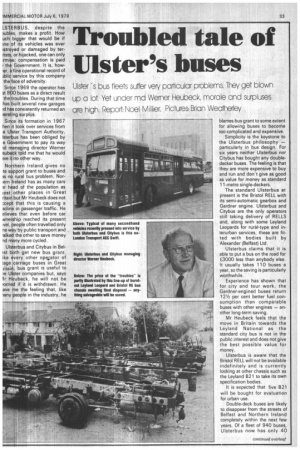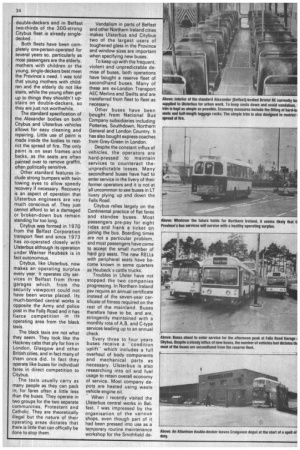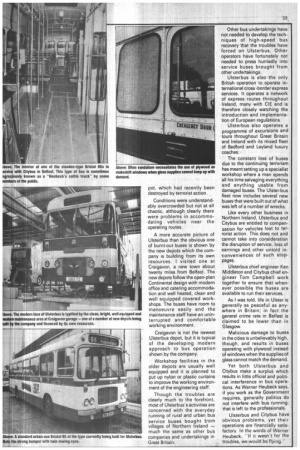Troubled tale of Ulster's buses
Page 35

Page 36

Page 37

If you've noticed an error in this article please click here to report it so we can fix it.
Ulster 's bus fleets suffer very particular problems. They get blown up a lot. Yet under md Werner Heubeck, morale and surpluses are high, Report: \oel Millier. Pictures: Brian Wea erley
LS ERBUS, despite the )ub es, makes a profit. How uch bigger that would be if ine of its vehicles was ever istr yed or damaged by terrist , or hijacked, one can only irmi e; compensation is paid th Government. It is, howier, fine operational record of ibliu service by this company the face of adversity.
Si ce 1969 the operator has st 810 buses as a direct result the troubles. During that time has built several new garages h s consistently returned an )era irig surplus.
Si ce its formation in 1967 hen it took over services from e U ster Transport Authority, lster us has been obliged by e G vernment to pay its way id anaging director Werner aub ck told me that he would ivei no other way.
No them n Ireland gives no te s pport grant to buses and )s n rural bus problem. Nor'ern Ireland has as many cars er h ad of the population as lost other places in Great ritai but Mr Heubeck does not licep that this is causing a eclin in passenger traffic. He alie es that even before car itvne ship reached its present eople often travelled only ne w y by public transport and ialke the other to save money rid any more cycled.
Ul erbus and Citybus in Belist b th get new bus grant. ike very other ope,sator of tage carriage buses in Great ritai , bus grant is useful to le U ter companies but, says 1r H ubeck, he will not be rorri d if it is withdrawn. He ave e the feeling that, like iany seople in the industry, he blames bus grant to some extent for allowing buses to become too complicated and expensive.
Simplicity is the keystone to the Ulsterbus philosophy — particularly in bus design. For six years neither Ulsterbus nor Citybus has bought any doubledecker buses. The feeling is that they are more expensive to buy and run and don't give as good as value for money as standard 11-metre single-deckers.
The standard Ulsterbus at present is the Bristol RELL with its semi-automatic gearbox and Gardner engine. Ulsterbus and Citybus are the only operators still taking delivery of RELLS and, along with some Leyland Leopards for rural-type and interurban services, these are fitted with bodies built by Alexander (Belfast) Ltd.
Ulsterbus claims that it is able to put a bus on the road for £3000 less than anybody else. It usually takes 110 buses a year, so the saving is particularly worthwhile.
Experience has shown that for city and tour work, the Gardner-engined buses return 121/2 per cent better fuel con sumption than comparable buses with other engines — another long-term saving.
Mr Heubeck feels that the move in Britain towards the Leyland National as the standard city bus is not in the public interest and does not give the best possible value for money.
Ulsterbus is aware that the Bristol RELL will not be available indefinitely and is currently looking at other chassis such as the Leyland B21 to take its own specification bodies.
It is expected that five B21 will be bought for evaluation for urban use.
Double-deck buses are likely to disappear from the streets of Belfast and Northern Ireland completely within the next few years. Of a fleet of 940 buses, Ulsterbus now has only 40 double-deckers and in Belfast two-thirds of the 300-strong Citybus fleet is already singledecked.
Both fleets have been completely one-person-operated for several years so, particularly as most passengers are the elderly, mothers with children or the young, single-deckers best meet the Province's need. I was told that young mothers with children and the elderly do not like stairs, while the young often get up to things they shouldn't upstairs on double-deckers, so they are just not worthwhile.
The standard specification of the Alexander bodies on both Citybus and Ulsterbus vehicles allows for easy cleaning and repairing. Little use of paint is made inside the bodies to restrict the spread of fire. The only paint is on seat frames and backs, as the seats are often painted over to remove graffiti, often politically sensitive.
Other standard features include strong bumpers with twin towing eyes to allow speedy recovery if necessary. Recovery is an aspect of operation that Ulsterbus engineers are vey much conscious of. They just cannot afford to let a damaged or broken-down bus remain standing for too long.
Citybus was formed in 1970 from the Belfast Corporation transport fleet and since 1973 has co-operated closely with Ulsterbus although its operation under Werner Heubeck is in fact autonomous.
Citybus, like Ulsterbus, now makes an operating surplus every year. It operates city services in Belfast from three garages which, from the security viewpoint could not have been worse placed. Its much-bombed central works is opposite the Army and police post in the Falls Road and it has fierce competition in its operating area from the black taxis.
The black taxis are not what they seem. They look like the Hackney cabs that ply for hire in London, Glasgow and other British cities, and in fact many of them once did. In fact they operate like buses for individual fares in direct competition to Citybus.
The taxis usually carry as many people as they can pack in, for fares often a little less than the buses, They operate in two groups for the two separate communities, Protestant and Catholic. They are theoretically illegal but the nature of their operating areas dictates that there is little that can offically be done to stop them. Vandalism in parts of Belfast and other Northern Ireland cities makes Ulsterbus and Citybus two of the largest users of toughened glass in the Province and window sizes are important when specifying new buses.
To keep up with the frequent, violent and unpredictable demise of buses, both operations have bought a reserve fleet of secondhand buses. Many of these are ex-London Transport AEC Merlins and Swifts and are transferred from fleet to fleet as necessary.
Other buses have been bought from National Bus Company subsidiaries including Potteries, Southdown, Northern General and London Country. It has also bought express coaches from Grey-Green in London.
Despite the constant influx of vehicles, the operators are hard-pressed to maintain services to counteract theunpredictable losses. Many secondhand buses have had to enter service in the livery of their former operators and it is not at all uncommon to see buses in LT livery plying up and down the Falls Road.
Citybus relies largely on the Continental practice of flat fares and standee buses. Most passengers pre-pay for eight rides and frank a ticket on joining the bus. Boarding times are not a particular problem, and most passengers have come to accept the small number of hard grp seats. The new RELLs with peripheral seats have become known in some quarters as Heubeck's cattle trucks.
Troubles in Ulster have not stopped the two companies progressing. In Northern Ireland psv require an annual certificate instead of the seven-year certificate of fitness required on the rest of the mainland. Buses therefore have to be, and are, stringently maintained with a monthly rota of A,B, and C-type services leading up to an annual check.
Every three to four years buses receive a "condition uplift" which includes a full overhaul of body components and mechanical parts as necessary. Ulsterbus is also researching into oil and fuel usage to retain overall economy of service. Most company depots are heated using waste vehicle engine oil.
When I recently visited the Ulsterbus central works in Belfast, I was impressed by the organisation of the various shops, even though part of it had been pressed into use as a temporary routine maintenance workshop for the Smithfield de pot, which had recently been destroyed by terrorist action.
Conditions were understandably overcrowded but not at all chaotic, although clearly there were problems in accommodating vehicles near the operating routes.
A more accurate picture of Ulsterbus than the obvious one of burnt-out buses is shown by the new depots which the company is building from its own resources. I visited one at Craigavon, a new town about twenty miles from Belfast. The new depots follow the open-plan Continental design with modern office and catering accommodation and well heated, clean and well equipped covered workshops. The buses have room to manoeuvre easily and the maintenance staff have an uninterrupted and comfortable working environment.
Craigavon is not the newest Ulsterbus depot, but it is typical of the developing modern approach to bus operation shown by the company.
Workshop facilities in the older depots are usually well equipped and it is planned to put up nylon or plastic curtains to improve the working environment of the engineering staff.
Though the troubles are clearly much to the forefront, most of Ulsterbus's activities are concerned with the everyday running of rural and urban bus service buses bought trom villages of Northern Ireland — much the same as other bus companies and undertakings in Great Britain. Other bus undertakings have not needed to develop the techniques of high-speed bus recovery that the troubles have forced on Ulsterbus. Other operators have fortunately not needed to press hurriedly into service buses brought from other undertakings.
Ulsterbus is also the only British operation to operate international cross -border express services. It operates a network of express routes throughout Ireland, many with CIE and is therefore closely watching the introduction and implementation of European regulations.
Ulsterbus also operates a programme of excursions and tours throughout Great Britain and Ireland with its mixed fleet of Bedford and Leyland luxury coaches.
The constant loss of buses due to the continuing terrorism has meant setting up a specialist workshop where a man spends all his time salvaging everything and anything usable from damaged buses. The Ulster-bus fleet now includes several new buses that were built out of what was left of a number of wrecks.
Like every other business in Northern Ireland, Ulsterbus and Citybus are entitled to compensation for vehicles lost to terrorist action. This does not and cannot take into consideration the disruption of service, loss of earnings and other untold inconveniences of such stoppages.
Ulsterbus chief engineer Ken Middleton and Citybus chief engineer Tom Campbell work together to ensure that whenever possible the buses are available to run their services.
As I was told, life in Ulster is generally as peaceful as anywhere in Britain; in fact the general crime rate in Belfast is claimed to be lower than in Glasgow.
Malicious damage to buses in the cities is unbelievably high, though, and results in buses operating with plywood instead of windows when the supplies of glass cannot match the demand.
Yet both Ulsterbus and Citybus make a surplus which results in little official and political interference in bus operations. As Werner Heubeck says, if you work as the Government requires, generally politics do not interfere with bus running; that is left to the professionals.
Ulsterbus and Citybus have obvious problems, yet their operations are financially satisfactory. In the words of Werner Heubeck, -If it wasn't for the troubles, we would be flying."'




























































































































